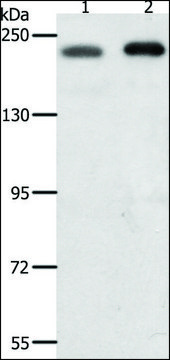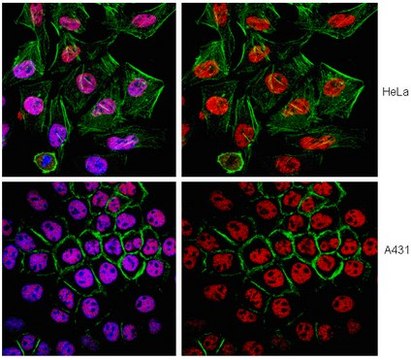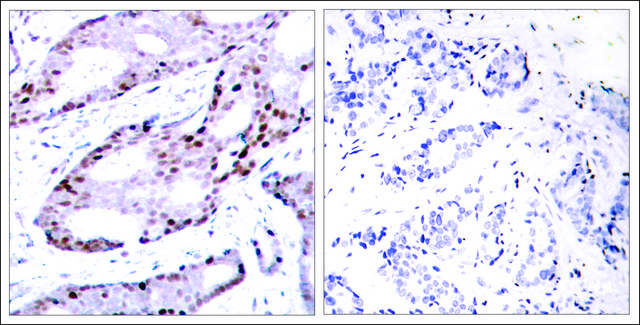C-12916
Human M1 Macrophages (hMDM-GMCSF(-))
Monocyte-derived, single donor, 5 million cryopreserved cells
Synonym(s):
hMDM-GMCSF(-) cells
Sign Into View Organizational & Contract Pricing
Select a Size
100 μL
₩8,19,613
₩8,19,613
Please contact Customer Service for Availability
A recombinant, preservative-free antibody is available for your target. Try ZRB1532
Request a Bulk Order
Select a Size
Change View
100 μL
₩8,19,613
About This Item
UNSPSC Code:
41106514
NACRES:
NA.81
₩8,19,613
Please contact Customer Service for Availability
A recombinant, preservative-free antibody is available for your target. Try ZRB1532
Request a Bulk Order
Recommended Products
biological source
human blood (monocyte)
packaging
pkg of 500,000 cells
morphology
(macrophages)
technique(s)
cell culture | mammalian: suitable
shipped in
dry ice
storage temp.
−196°C
General description
Lot specific orders are not able to be placed through the web. Contact your local sales rep for more details.
Cell Line Origin
Monocyte
Application
Cryopreserved human monocyte-derived macrophages (hMDM) are convenient and easy-to-handle. The thawed cells plate into all tissue culture vessel formats and can be maintained as adherent, biologically functional cultures for several weeks. Optionally, user-customizable activation of the cells can be performed.Cryopreserved human macrophages are produced from monocytes in M1 Macrophage Generation Media DXF and are available as non-activated, fully qualified M1- (GM-CSF) polarized cells. After 9-10 days of differentiation, the M1 macrophages are cryopreserved using Cryo-SFM. Each cryo vial contains more than 5 million viable cells after thawing.
Warning
Although tested negative for HIV-1, HIV-2, HBV, HCV, HTLV-1 and HTLV-2, the cells – like all products of human origin – should be handled as potentially infectious. No test procedure can completely guarantee the absence of infectious agents.
Subculture Routine
Click here for more information.
Other Notes
Recommended Plating Density: 100000 cells per cm2Tested Markers: CD80 positive, CD68 positiveNote: The plated cells do not proliferate. Recommended plating density for obtaining an adherent cell monolayer with 70-90% confluency.
Recommended products
Recommended Primary Cell Culture Media:Link
Recommended Primary Cell Culture Media:Link
Disclaimer
RESEARCH USE ONLY. This product is regulated in France when intended to be used for scientific purposes, including for import and export activities (Article L 1211-1 paragraph 2 of the Public Health Code). The purchaser (i.e. enduser) is required to obtain an import authorization from the France Ministry of Research referred in the Article L1245-5-1 II. of Public Health Code. By ordering this product, you are confirming that you have obtained the proper import authorization.
Storage Class Code
12 - Non Combustible Liquids
WGK
WGK 2
Flash Point(F)
Not applicable
Flash Point(C)
Not applicable
Choose from one of the most recent versions:
Certificates of Analysis (COA)
Lot/Batch Number
It looks like we've run into a problem, but you can still download Certificates of Analysis from our Documents section.
If you need assistance, please contact Customer Support
Already Own This Product?
Find documentation for the products that you have recently purchased in the Document Library.
Anika Steffen et al.
The EMBO journal, 23(4), 749-759 (2004-02-07)
The Rho-GTPase Rac1 stimulates actin remodelling at the cell periphery by relaying signals to Scar/WAVE proteins leading to activation of Arp2/3-mediated actin polymerization. Scar/WAVE proteins do not interact with Rac1 directly, but instead assemble into multiprotein complexes, which was shown
Local F-actin network links synapse formation and axon branching.
Chia, PH; Chen, B; Li, P; Rosen, MK; Shen, K
Cell null
Patricia Kunda et al.
Current biology : CB, 13(21), 1867-1875 (2003-11-01)
In animal cells, GTPase signaling pathways are thought to generate cellular protrusions by modulating the activity of downstream actin-regulatory proteins. Although the molecular events linking activation of a GTPase to the formation of an actin-based process with a characteristic morphology
Marco A Salazar et al.
The Journal of biological chemistry, 278(49), 49031-49043 (2003-09-25)
Tuba is a novel scaffold protein that functions to bring together dynamin with actin regulatory proteins. It is concentrated at synapses in brain and binds dynamin selectively through four N-terminal Src homology-3 (SH3) domains. Tuba binds a variety of actin
Reply to "Reduced CYFIP2 Stability by Arg87 Variants Causing Human Neurological Disorders".
Mitsuko Nakashima et al.
Annals of neurology, 86(5), 805-806 (2019-09-12)
Our team of scientists has experience in all areas of research including Life Science, Material Science, Chemical Synthesis, Chromatography, Analytical and many others.
Contact Technical Service







